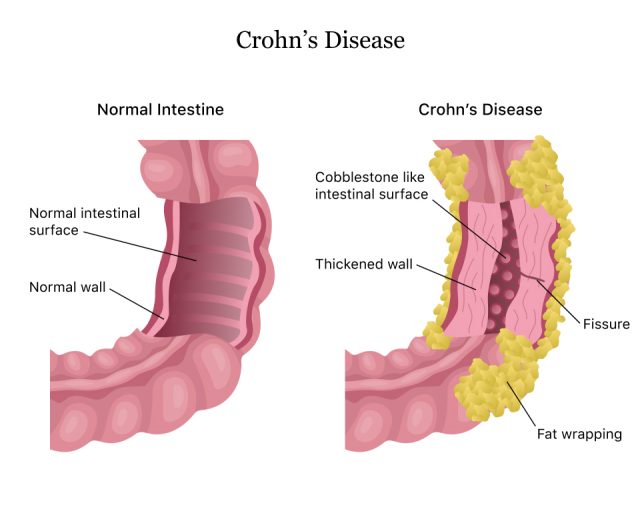Crohn’s Disease
Crohn’s disease is a type of chronic inflammatory bowel disease that causes inflammation in the digestive tract. Symptoms of Crohn’s include stomach cramps, severe diarrhea, fatigue, abdominal pain and malnutrition. It most often affects the small intestine and part of the large intestine, but it can affect any part of the digestive tract.

More than half a million Americans have Crohn’s disease, and it’s becoming more common, according to the National Institute of Diabetes and Digestive Kidney Diseases.
Most people find out they have Crohn’s in their 20s and 30s, but it can happen to anyone at any age. Crohn’s disease and ulcerative colitis are the two most common types of inflammatory bowel disease. While Crohn’s can affect any part of the digestive tract, it typically affects the small intestine and parts of the large intestine (colon). It can attack some parts of the digestive tract while skipping over other parts. Ulcerative colitis only causes inflammation in the large intestine and does not skip sections of the tract.
There is no cure for Crohn’s. While its symptoms or complications can be life threatening, it’s not a fatal disease. People with Crohn’s have a similar life expectancy to people without it, but their quality of life will be decreased. With the proper treatment, people with the disease can manage symptoms and improve their quality of life.

Five Types of Disease
There are five types of Crohn’s disease according to the Crohn’s & Colitis Foundation. These are ileocolitis, ileitis, gastroduodenal Crohn’s disease, jejunoileitis and Crohn’s colitis. Some medical centers recognize a sixth type called perianal disease.
Each type affects a different part of the digestive tract and causes different symptoms and complications.
Ileocolitis
Ileocolitis is the most common type of Crohn’s disease, and it affects about 50 percent of patients, according to Beth Israel Deaconess Medical Center. The end of the small intestine and the large intestine are affected.
It causes pain in the lower and middle abdomen. Other symptoms include cramping, diarrhea and significant weight loss.
Ileitis
Ileitis only affects the ileum, the last part of the intestine. About 30 percent of Crohn’s patients experience this type.
It has the same symptoms as ileocolitis, but severe cases may cause abscesses in the lower part of the abdomen and fistulas — abnormal connections between two body parts, such as organs or blood vessels.
Gastroduodenal Crohn’s Disease
Gastroduodenal Crohn’s disease is also called upper GI Crohn’s disease, and it affects the stomach and the first part of the small intestine called the duodenum. This type is uncommon and affects about five percent of patients.
Symptoms include vomiting, nausea, weight loss, loss of appetite and pain in the upper abdomen.
Jejunoileitis
Jejunoileitis affects the upper half of the small intestine, called the jejunum. It causes patchy areas of inflammation and is uncommon.
Symptoms include abdominal pain after eating that may be mild to intense, weight loss, diarrhea and malnutrition. In severe cases, fistulas may form.
Crohn’s (Granulomatous) Colitis
Crohn’s colitis only affects the large intestine, or colon, and affects about 20 percent of patients. Symptoms include rectal bleeding, abdominal pain, diarrhea and anal disorders such as abscesses and ulcers. People who have this type may also develop joint pains and skin lesions.
Perianal Disease
Perianal disease affects the anus — up to one-third of Crohn’s patients have this type of disease. Symptoms include fistulas, sores or ulcerations, abscesses and skin tags outside the anus.
Diarrhea and Other Symptoms
Symptoms of Crohn’s range from mild to very severe. For example, people with mild disease may have abdominal pain or frequent diarrhea, but can eat normally and don’t have weight loss. People with very severe disease have high fevers, persistent vomiting, intestinal obstructions or abscesses and severe weight loss.
While Crohn’s affects the digestive tract, it may also cause extraintestinal symptoms. These symptoms affect parts of the body outside the digestive tract, such as the eyes, joints and skin.
- Abdominal tenderness and pain
- Anal fissures
- Diarrhea
- Extraintestinal symptoms affecting the joints, skin, liver, and eyes
- Fatigue
- Fever
- Fistulas, obstructions, perforations and abscesses
- Growth problems in children
- Loss of appetite
- Perianal lesions
- Rectal bleeding
- Upper gastrointestinal symptoms
- Vomiting
- Weight loss
Causes
Researchers don’t fully understand what causes Crohn’s. At one time, doctors speculated that stress and diet might cause the disease. More studies led doctors to believe that while these factors may aggravate symptoms, they don’t cause Crohn’s.
Now, the most popular theory is that Crohn’s is an autoimmune condition. This means that the immune system overreacts to bacteria or viruses in the gastrointestinal tract. While attempting to fight these organisms, it also attacks healthy cells, causing chronic inflammation.
Some scientists believe that certain people’s genes may make them more susceptible to having Crohn’s.
People who have been diagnosed with cancer after taking the antacid Zantac may also receive a Crohn’s diagnosis from their doctor. Stomach, intestine, colorectal and bladder cancers are a handful of the main cancers associated with Zantac in claims.
Risk Factors
While researchers don’t know what causes Crohn’s, certain factors increase a person’s risk for developing the disease.
- Age
- People of any age can get Crohn's disease, but younger people between the ages of 15 and 35 are at the highest risk.
- Ethnicity
- Crohn’s disease is most common in Caucasians, especially people of Ashkenazi Jewish descent. However, the incidence of Crohn's disease is increasing among Asians and Hispanics as well as African Americans.
- Family Members with Crohn’s
- People who have a parent, sibling or child with Crohn’s are at greater risk of developing the disease. As many as 1 in 5 people (20 percent) with the disease have a family member with the disease.
- Smoking Cigarettes
- People who smoke are at greater risk for Crohn’s, and smoking can make existing disease more severe. While many risks for Crohn’s are out of a person’s control, smoking is a modifiable risk. This means people may lower their risk if they stop smoking.
- Nonsteroidal Anti-Inflammatory Drugs (NSAIDs)
- Using NSAIDs doesn’t cause Crohn's disease, but it can make symptoms worse.
- Environmental Factors
- Crohn’s is more prevalent in developed countries and urban towns and cities than in undeveloped countries and rural areas. The disease is also more prevalent in northern climates.
People who have Crohn’s are at risk for several complications from bowel obstructions to colon cancer.
- Abscesses, painful pockets of infection filled with pus
- Acid reflux can occur in people whose disease affects the esophagus
- Anal fissures, painful tears in the anus that cause bleeding and itching
- Bowel obstructions, caused by thickening of intestinal walls, can block stool or food from moving through the digestive tract
- Colon cancer is more likely to develop in people with untreated Crohn’s in their large intestine
- Eye inflammation
- Fistulas
- Gallstones and gallbladder disease are more likely to occur in people with Crohn’s
- Higher risk of premature labor or low birth weight if mothers have flare-ups of disease during pregnancy
- Joint inflammation
- Malnutrition, including anemia from low iron and B-12
- Skin problems
- Ulcers may occur in the intestines, mouth or anus
- Kidney stones
Diagnosis and Treatment
Doctors diagnose Crohn’s with blood tests, fecal tests and imaging procedures that look inside the colon, such as a colonoscopy, CT scans and MRIs.
Crohn’s disease has no cure, so treatment focuses on preventing complications, healing the intestinal lining and preventing surgery. Each person’s treatment plan is different depending on the severity of the disease.
Medications
Medications for Crohn’s suppress the immune system to treat symptoms or complications such as diarrhea and infections.
Antibiotics
Antibiotics treat infections which can lead to can lead to abscesses. These include ciprofloxacin, tetracycline, ampicillin and metronidazole.
Antidiarrheal Medication
People with Crohn’s may have severe diarrhea. Antidiarrheal drugs — such as Imodium A-D (loperamide), Lomocot, Lomotil (diphenoxylate), Prevalite and Questran (cholostyramine) and Pepto-Bismol (bismuth subsalicylate) — can help manage this symptom.
Immune System Suppressors
These medications suppress the immune system to calm inflammation. Examples include Remicade (infliximab), Humira (adalimumab), Cimzia (certolizumab pegol), Trexall (methotrexate), Stelara, (ustekinumab) and Entyvio (vedolizumab).
Corticosteroids
Prednisone, cortisone and other corticosteroids reduce inflammation. These should not be used long term and are usually a bridge to stronger medications.
Nutrition and Diet
Diet doesn’t cause Crohn’s but certain foods may make symptoms worse. It’s also important to eat a healthy diet to replace lost nutrients and promote healing.
For people with Crohn’s, eating can be uncomfortable because of pain in the abdomen. Loss of appetite may also make it difficult to eat. Additionally, diarrhea can make it more difficult for the body to absorb nutrients.
These challenges may affect a patient’s overall health, especially because an estimated 70 percent to 80 percent of immune cells live in the gut.
There is no specific meal plan for Crohn’s patients, but the Crohn’s & Colitis Foundation recommends eating smaller meals, drinking slowly, preparing meals in advance and using simple techniques such as steaming, poaching, grilling or steaming.
- Foods with a lot of fiber that are hard to digest, such as raw green vegetables, whole nuts, whole grains and fruits with seeds and skin
- Lactose-containing dairy
- Sugary foods
- Alcohol and caffeine
- Spicy foods
- High fat foods such as butter, margarine, fried food and cream
Procedures
If medications aren’t enough, doctors may recommend other procedures to control Crohn’s and treat complications.
Bowel Rest
Bowel rest involves not eating or drinking for several days or longer. This gives the intestines a chance to heal. Patients will get their nutrition intravenously or through a feeding tube.
Surgery
Surgery isn’t a cure for Crohn’s but it may be necessary to treat complications such as bleeding, fistulas, blockages or intestinal perforations (holes).
Calling this number connects you with a Drugwatch representative. We will direct you to one of our trusted legal partners for a free case review.
Drugwatch's trusted legal partners support the organization's mission to keep people safe from dangerous drugs and medical devices. For more information, visit our partners page.

